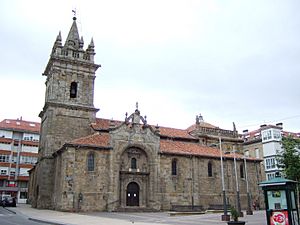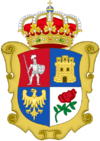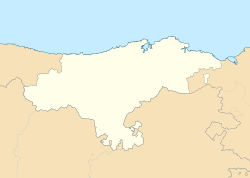Reinosa facts for kids
Quick facts for kids
Reinosa
|
|||
|---|---|---|---|

Church of San Sebastián (16th century).
|
|||
|
|||
| Country | |||
| Autonomous community | |||
| Province | Cantabria | ||
| Comarca | Campoo | ||
| Judicial district | Reinosa | ||
| Area | |||
| • Total | 4.12 km2 (1.59 sq mi) | ||
| Elevation | 851 m (2,792 ft) | ||
| Population
(2018)
|
|||
| • Total | 9,095 | ||
| • Density | 2,207.5/km2 (5,717/sq mi) | ||
| Demonym(s) | Reinosanos | ||
| Time zone | UTC+1 (CET) | ||
| • Summer (DST) | UTC+2 (CEST) | ||
| Official language(s) | Spanish | ||
Reinosa is a small town, or municipality, located in Cantabria, a region in northern Spain. As of 2009, about 10,307 people lived there. Even though it's one of the smallest areas in Cantabria, Reinosa is very important. It is one of the closest towns to where the Ebro River begins.
Reinosa is surrounded by the municipality of Campoo de Enmedio. In 1927, King Alfonso XIII officially made Reinosa a city. It is one of only three places in Cantabria to have this special title. The other two cities are Santander and Torrelavega.
Contents
History of Reinosa
Early Beginnings of the Town
The first written records that mention Reinosa are from around the year 1000. At that time, the town was divided into four parts called solars. This division was made by Sancho García, who was the Count of Castile.
By 1404, Reinosa started to become the most important town in its region. It was organized into seven Hermandades, which were like local groups. These groups acted as military units to help keep law and order in the area.
Town Leadership and Royal Visits
The leaders of these brotherhoods, called procurators, would meet once a month. They met with the Corregidor, who was a local official, to manage the town's daily business.
In 1497, a very important meeting happened in Reinosa. Prince John, who was the son of Queen Isabella I and King Ferdinand II, met his future wife here. Her name was Margaret of Austria. This meeting or their marriage ceremony likely took place at a building known as La Casa de las Princesas.
Growth and Development
In 1517, Charles V, Holy Roman Emperor was traveling through Reinosa when he became ill. He stayed for nine days at the Convento de San Francisco to recover. This convent was still being built at the time. About a hundred years later, the convent had thirty friars, and the town had about five hundred people living there.
In the 1700s, during the time of the Bourbon kings, new roads and a bridge over the River Ebro were built. These projects helped the area's economy grow a lot. Reinosa became a busy and successful place. It was on one of the main routes leading to the port city of Santander. In 1927, King Alfonso XII gave Reinosa its official city status.
Geography of Reinosa
Reinosa is the biggest town in its part of Cantabria. It is located on the main railway line and is also close to the A67 motorway. This makes it easy to reach. The town has several hotels and restaurants for visitors. Montesclaros High School is also located here.
The Ebro River and Its Reservoir
The River Ebro starts just 3 kilometers (about 1.8 miles) from Reinosa. Its source is in the village of Fontibre, where a stream flows out of the ground.
A large artificial lake, called Embalse del Ebro, was created by building a dam on the river. This dam is located just below Reinosa. This lake is one of the biggest reservoirs in northern Spain. It mostly fills up in the spring when the winter snow in the mountains melts. The Embalse del Ebro is the first of many reservoirs along the Ebro River.
Sister Cities
Reinosa has a special connection with another town:
 Deltebre, Spain, which is located where the Ebro River meets the sea.
Deltebre, Spain, which is located where the Ebro River meets the sea.
More Information
In Spanish: Reinosa para niños
 | Jewel Prestage |
 | Ella Baker |
 | Fannie Lou Hamer |






